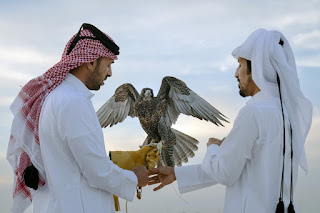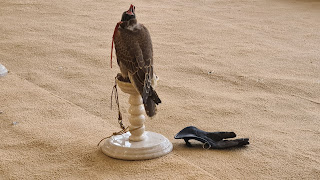Falcon hunting keeps Qatar’s Bedouin traditions alive
Doha, Qatar: (December 31): Falconry offers a glimpse at how
Qatar used to be. The millennia-old sport remains extremely popular amongst
Qatar's elite and is keeping Qatar’s Bedouin traditions alive. Centuries ago,
Bedouin tribesmen used falcons to hunt for meat in the winter. These days,
falconry is a popular sport and hobby for many Qataris and the falcon is also
the country’s national bird
Come Sunday 1st January 2023, one will get know the sport from
close quarters during the 14th edition of the Qatar International Falcons and
Hunting Festival (Marmi 2023) will starts at Sabkhat Marmi in Sealine and will
end on 28 January 2023.
Held annually under the patronage of HE Sheikh Joaan bin
Hamad Al Thani, the festival is being organised by the Qatar Al Gannas Society
and is one of the largest festivals in the specialized field of falcons and
hunting in the region.
Al Gannas, a cultural association for hunters was founded in
2008 and is dedicated to promoting traditional Arabic hunting.
Marmi Festival is one important event as falconers were
registered in the 2011 World Heritage list. It is regarded as one of the key
components of the original Qatari culture as it displays a variety of
characteristics of history and legacy and works to preserve them for future
generations.
It represents Arab hunters in international and regional
contests, organising events and providing support. The association includes the
best facilities and equipment required for hunting, and encourages research and
studies in the field.
There will be two tournaments each day, 8 am and 11 am and
also contest for Young Falconer and the Promising Falconer.
Ali Khatim al-Mehshadi, head of the Organising Committee of
Marmi 2023 and chairman of Al Qannas Society, said that the Festival will have
a total of 44 groups competing at a rate of five groups a day. He stressed that
the society is keen on supporting Qatari falconers and farm owners to produce
the best breeds of falcons as the Festival hosts the most beautiful falcons
contest every year. This year's contest will have more categories to encourage
falconers, the official added.
Last year, around 1,400 falcons participated during the 13th
edition of the festival. The event has also become a tourist attraction for
visitors as it gained a wide audience.
The sport of falconry began over 5,000 years ago in Iran,
and spread over the centuries to East and West. The sport was introduced to
Qatar through Bedouin tribes who used the birds as a tool for hunting. They
discovered that it was much easier to allow the raptors to take down birds
migrating across the Arabian Peninsula than it was to shoot them down
themselves. This Bedouin method of falconry set the basis for the modern
version of the sport practiced in Qatar.
Although, over the centuries, falconry has virtually
disappeared from the European continent, the sport lives on in the Middle East.
In Qatar, you can still purchase falcons in downtown Doha at falcon souqs or
through private dealers. The best raptors can cost thousands of dollars and may
even be issued their own Qatari passports to ensure they are not stolen or
taken out of the country without the owner's permission. Due to these elaborate
methods of theft prevention, it is not uncommon for you to be seated beside a
full-grown falcon when travelling on a Middle Eastern airliner.
Once you have purchased (or caught and trained) your falcon,
you proceed to enter a very competitive sport. Many Qataris spend fortunes on
their falconry equipment, which can include radio monitors, 4x4 trucks,
communication devices, and other high priced items. The reason for the
high-tech equipment is so that the hunters can arrive right when the bird is
taking down its prey, so they may separate the animals and kill the prey
according to Islamic customs.
But if you are considering participating in this ancient
sport, remember that a large amount of time must be invested in training the
birds, especially if they are caught in the wild. One of the techniques involves
keeping the bird on one's arm for several hours a day, which, aside from being
painful, would obviously prove problematic to anyone who has a regular job.
The most popular prey is the Houbara bustard, a large, fast
bird, which lives throughout the Middle East. That being said, the bird has
been hunted to the point of being endangered in Qatar. So falconers must
constantly travel the globe to search for new hunting grounds. It is said that
the best hunting grounds are found in the Iraqi desert.
Falconry offers a glimpse at how Qatar used to be. The
millennia-old sport remains extremely popular amongst Qatar's elite and new
efforts to restock the Qatari desert with Houbara bustards will ensure the
sport continues.







































0 Comments:
Post a Comment
Subscribe to Post Comments [Atom]
<< Home